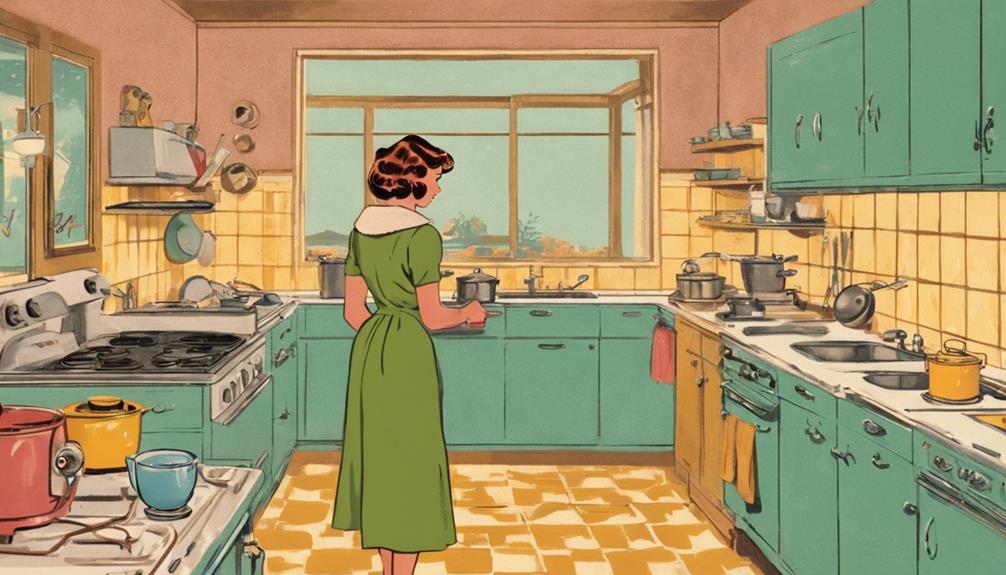As you analyze "The Young Housewife" poem, you'll notice Williams' modernist techniques subverting traditional poetic forms to critique societal expectations. The domestic sphere is portrayed as a confining space, symbolizing the isolation and monotony of the housewife's life. Imagery and language reinforce this confinement, highlighting the disconnection between the housewife's desires and obligations. The poem's use of symbols, like the kitchen and stove, mirrors the housewife's emotional state and suffocation. As you explore the poem further, you'll uncover a richer understanding of the suffocating nature of domestic roles and the longing for autonomy that lies beneath.
Unpacking the Poem's Modernist Style
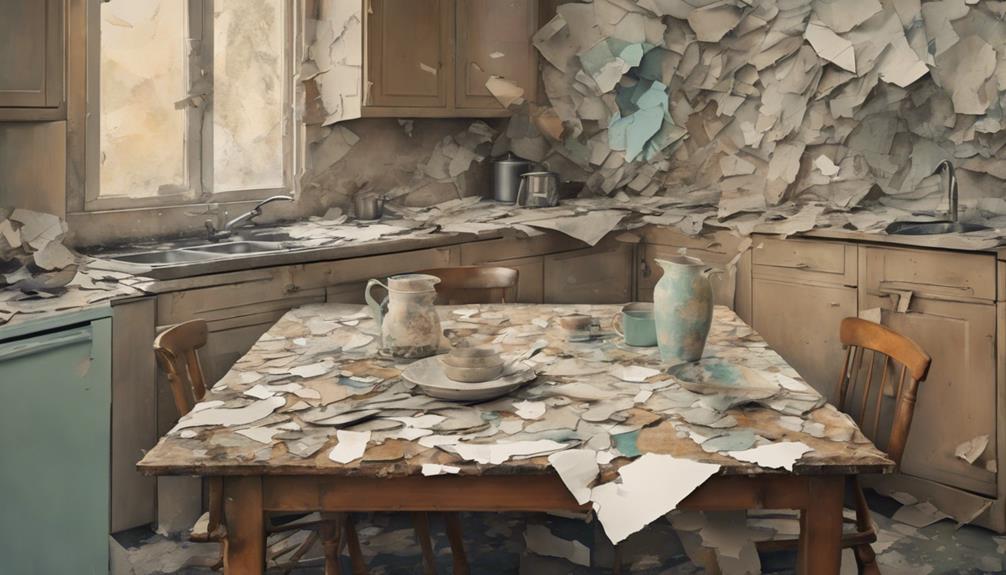
Investigating the linguistic and structural nuances of 'The Young Housewife' poem, how does William Carlos Williams' utilization of modernist techniques, such as fragmentation and Imagist principles, subvert traditional poetic forms and challenge the reader's expectations? As you explore the poem, you'll notice a fragmented narrative that defies conventional storytelling. Williams' use of disjointed language and short, staccato sentences creates a sense of dislocation, mirroring the housewife's own disconnection from the world outside her domestic sphere. This modernist style rejects traditional poetic structures, instead embracing a more experimental and avant-garde approach. By doing so, Williams forces you, the reader, to reevaluate your expectations of poetry and confront the stark realities of modern life. The fragmented narrative and disjointed language work in tandem to create a sense of disjointedness, underscoring the housewife's feelings of isolation and disconnection. As you navigate the poem, you'll find yourself reassembling the narrative, piecing together the fragmented images to form a cohesive whole.
The Isolation of Domestic Life
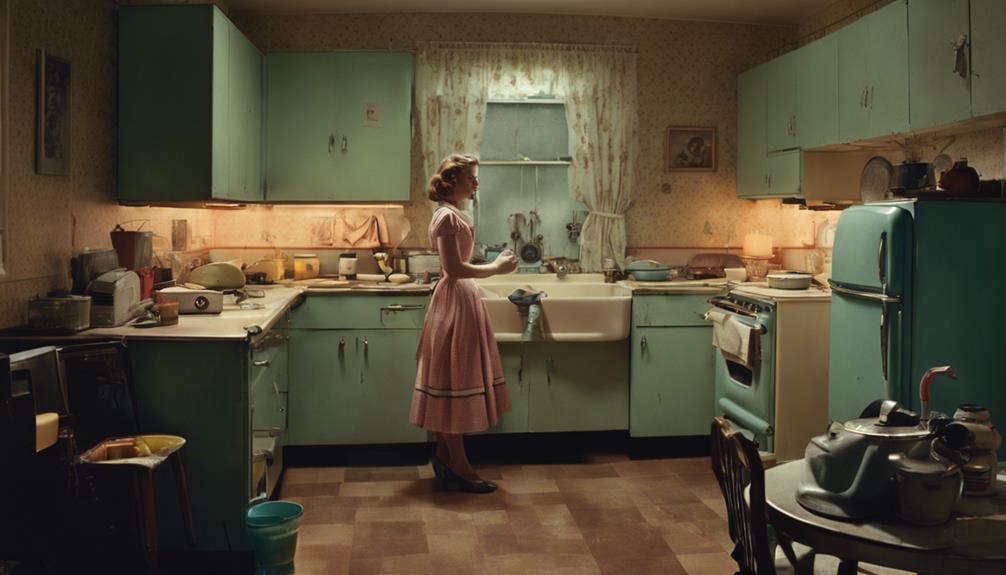
As you navigate the fragmented narrative of 'The Young Housewife,' it becomes apparent that the domestic sphere, typically perceived as a haven, is actually a confining space that isolates the housewife from the outside world. This poem masterfully exposes the dark underbelly of domesticity, revealing the ways in which the home can become a domestic prison, trapping the housewife in a cycle of monotony and isolation. The speaker's use of imagery and language reinforces this sense of confinement, creating a sense of claustrophobia that mirrors the housewife's emotional state.
The housewife's existence is characterized by feminine solitude, a state of being alone even when surrounded by others. This sense of disconnection is further emphasized by the speaker's use of fragmented sentences and disjointed narrative, which mirrors the fractured nature of the housewife's experience. Through this poetic exploration, it becomes clear that the domestic sphere is not the haven it appears to be, but rather a site of confinement, isolation, and disconnection.
Symbolism in the Young Housewife
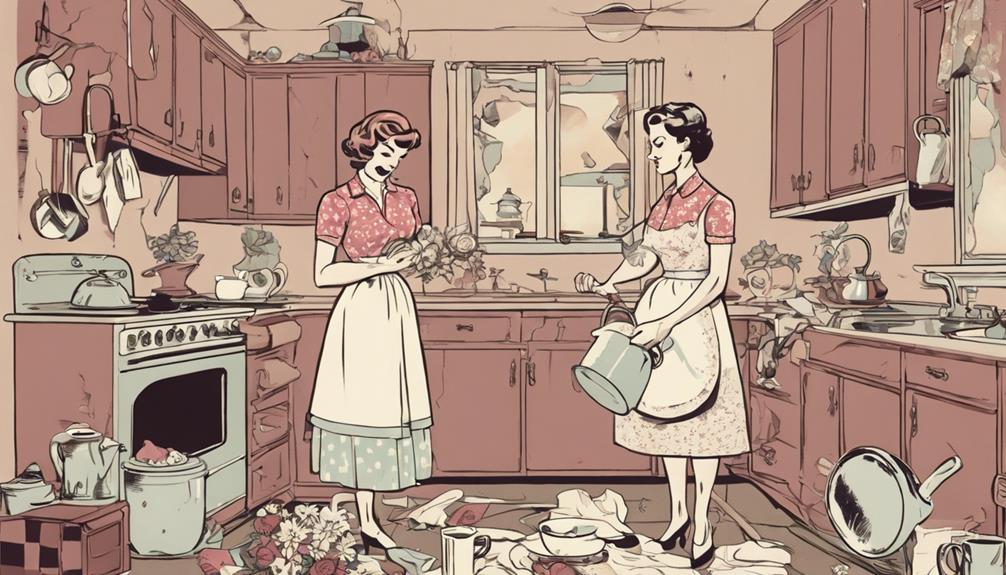
Through the careful examination of everyday objects, the poet cleverly embeds symbols that not only mirror the housewife's emotional state but also emphasize the suffocating nature of her domestic existence. As you explore the poem, you'll notice how ordinary objects are transformed into powerful symbols that express the housewife's feelings of entrapment. The home, typically associated with warmth and comfort, is instead depicted as a domestic prison, confining the housewife to a life of monotony and drudgery. The poet's use of symbols like the kitchen, the stove, and the food preparation rituals subtly reinforces the idea that the housewife is ensnared in a cycle of domesticity. This reinforcement of the feminine mystique, which romanticizes domestic life as the ultimate fulfillment for women, further highlights the sense of suffocation and despair that permeates the poem. By examining these symbols, you'll gain a deeper insight into the ways in which the poet critiques the societal expectations imposed on women, especially in the domestic realm.
The Power of Imagery and Sensuality
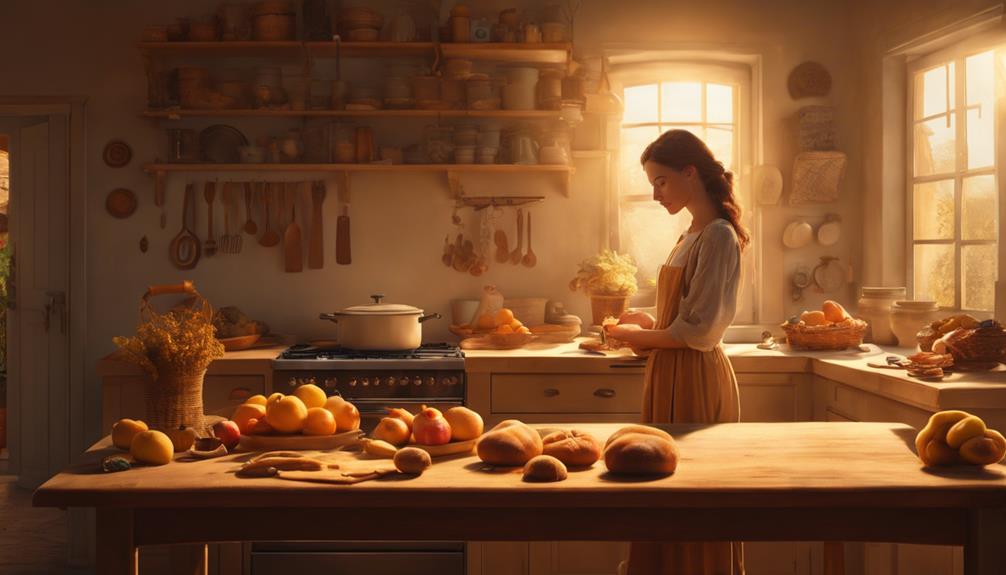
Rich sensory details permeate the poem, inviting you to immerse yourself in the housewife's stifling world, where the boundaries between reality and fantasy blur. The poet's use of sensual language creates a dreamlike atmosphere, drawing you into the housewife's inner world. You're enveloped in the warmth and comfort of her domestic bliss, where the scent of fresh-baked cookies wafts through the air, and the soft hum of domesticity provides a comforting background noise.
However, this idyllic scene is subtly undermined by the poet's clever use of imagery. The housewife's world is also one of confinement and suffocation, where the 'sweating' walls seem to close in on her. The sensual language that initially invites you in now takes on a more ominous tone, hinting at the stifling nature of her domestic existence. As you explore further into the poem, you begin to realize that the housewife's world is not as idyllic as it initially seems. The poet's masterful use of imagery and sensuality creates a sense of unease, leaving you to ponder the true cost of domestic bliss.
A Commentary on Societal Expectations
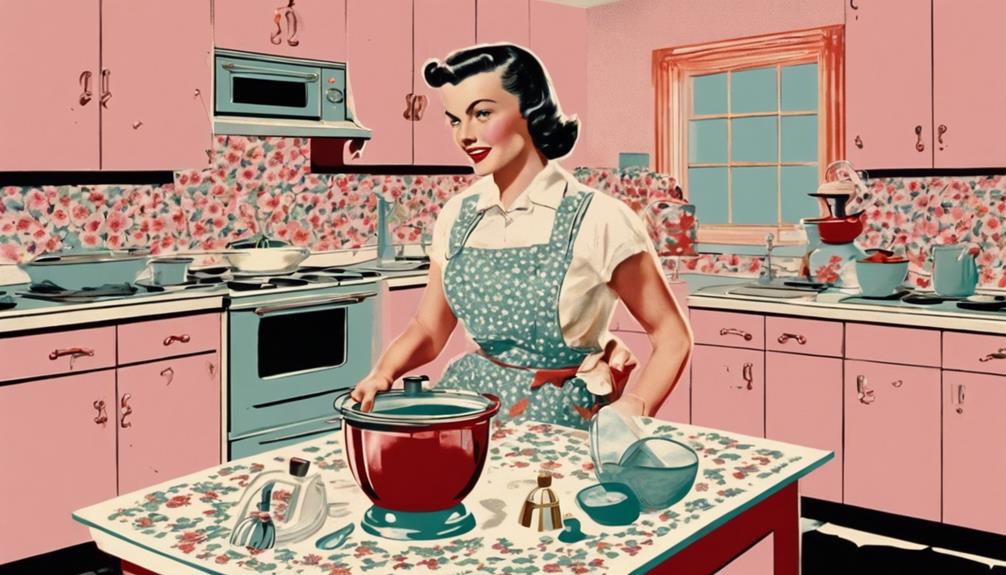
Examining the poem, you'll find that it critiques the societal expectations placed on young housewives, implying that their domestic roles are suffocating their individuality. The poem subtly yet effectively highlights the patriarchal norms that govern the lives of these women, restricting their autonomy and agency. By portraying the young housewife as trapped in a life of domesticity, the poem sheds light on the restrictive gendered roles that have been imposed upon them. These roles, rooted in outdated patriarchal norms, dictate that women prioritize domestic duties over personal aspirations, stifling their creativity and independence.
The poem's commentary on societal expectations is particularly striking, as it reveals the ways in which women's identities are often reduced to their domestic roles. By doing so, the poem raises important questions about the value placed on women's work and the limitations imposed upon them. Ultimately, the poem presents a scathing critique of the societal expectations that govern the lives of young housewives, urging readers to reconsider the restrictive norms that govern their lives.
The Inner Life of the Young Housewife
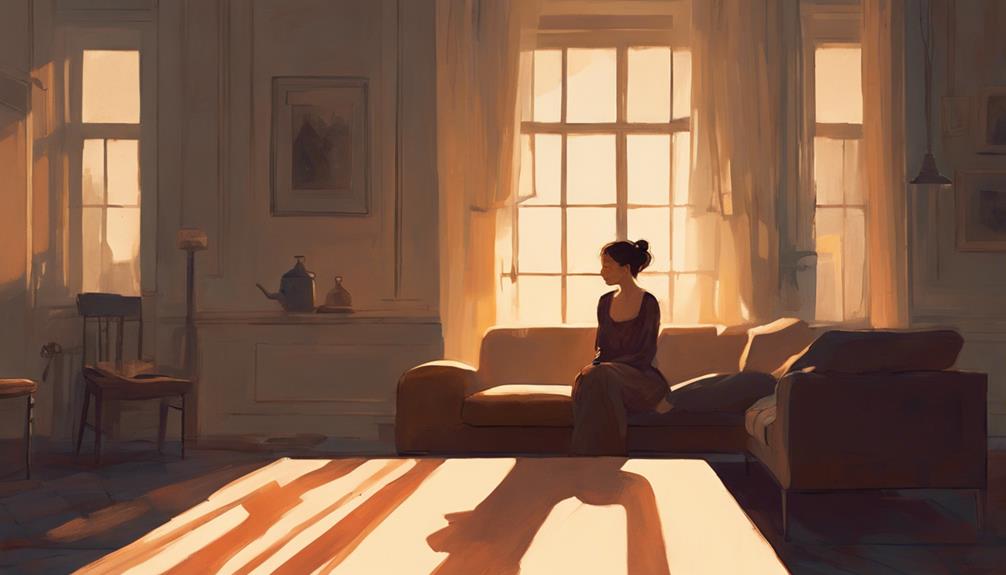
As you explore the inner life of the young housewife, you're met with a sense of stifled creativity and longing, revealing a profound disconnect between her domestic obligations and her own desires. This tension underscores the ways in which societal expectations can confine women to a narrow, predetermined role, effectively rendering their homes a domestic prison. The young housewife's inner world is characterized by a deep-seated desire for autonomy, creativity, and self-expression, which is constantly at odds with the mundane, repetitive tasks that define her daily life.
This internal conflict raises important questions about feminine identity and the ways in which women have been socialized to prioritize domesticity over personal fulfillment. The poem suggests that the traditional feminine ideal, which emphasizes nurturing and caregiving, can be suffocating and limiting, forcing women to sacrifice their own aspirations and desires on the altar of domesticity. By excavating the inner life of the young housewife, the poem sheds light on the complex, often fraught nature of feminine identity, and the ways in which women have been forced to navigate the treacherous terrain of societal expectations.
Frequently Asked Questions
What Inspired Williams to Write "The Young Housewife" Poem?
You think you're free, but aren't you trapped in a world of domesticity expectations? William Carlos Williams, a pioneer of modernism, was inspired to write "The Young Housewife" as a scathing critique of patriarchal constraints that suffocate individuality. He saw the monotony of household chores as a symbol of oppression, where women were reduced to mere objects. His poem is a reflection of the era's societal ills, where creativity was stifled by the weight of traditional roles.
Is the Young Housewife Based on a Real Person or Fictional?
You ponder whether the young housewife is rooted in reality or a product of Williams' imagination. In the early 20th century, when women's roles were rigidly defined, it's likely that Williams drew inspiration from his surroundings. The character's anonymity allows her to embody the collective experience of women during that historical context. Her fictional nature, however, lends literary significance, enabling Williams to explore themes and emotions without being tied to a specific individual's story.
What Year Was the Poem "The Young Housewife" First Published?
'Blood is thicker than water,' but in the world of literature, dates can be thicker than ink. You're curious about the publication year of 'The Young Housewife.' After digging into the poet's biography, you'll find that William Carlos Williams' poem was first published in 1916. Surprisingly, this year coincides with the height of Imagist movement, which heavily influenced Williams' use of literary devices like concise language and clear images in 'The Young Housewife.'
Is "The Young Housewife" a Feminist Poem, and Why or Why Not?
As you explore the poem, you'll question whether it's a feminist work. On one hand, the speaker's confinement and domesticity seem to reinforce patriarchal constraints, perpetuating traditional gender roles. On the other hand, the poem's subtle subversion of these constraints through the housewife's quiet defiance and inner life might suggest a feminist undertone.
How Does the Poem Relate to the American Dream Ideology?
You're chasing the American Dream, or so you thought. Behind the façade of prosperity and happiness lies a suffocating reality. You've bought into the middle-class expectations, where domestic confinement is masked as domestic bliss. The illusion of freedom is just that – an illusion. As you conform to societal norms, you're trapped in a gilded cage, sacrificing autonomy for a white-picket fence. The American Dream, it seems, is just a cleverly disguised prison sentence.
